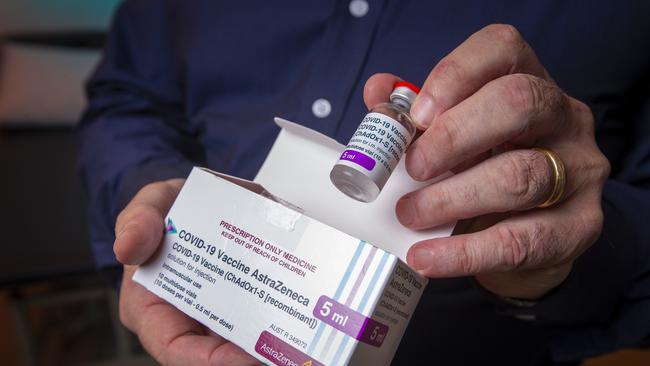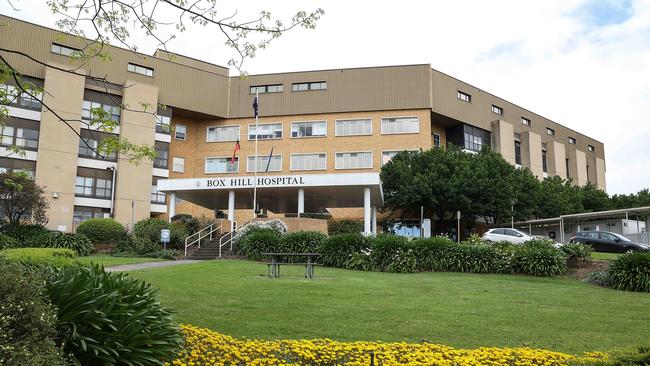Health experts call for calm amid concerns Melbourne man’s blood clot was caused by AstraZeneca vaccine
Experts are calling for public calm amid concerns a Melbourne man’s blood clots were caused by the AstraZeneca vaccine.
News
Don't miss out on the headlines from News. Followed categories will be added to My News.
Federal health experts have called for calm amid concerns the AstraZeneca vaccine was the cause of blood clots that saw a 44-year-old Melbourne man admitted to hospital 12 days after getting the jab.
The vaccine was declared “safe and effective’’ on Friday by both the acting chief medical officer and the head of the nation’s Therapeutic Goods Administration.
But anyone who has had the anti-COVID jab was urged to be on alert for telltale symptoms of severe, persistent headaches between four and 20 days after the vaccination.
The man was admitted to Box Hill Hospital with serious thrombosis and a low platelet count after being vaccinated with AstraZeneca about March 22.
Box Hill Hospital was unable to provide an update regarding the man’s condition and instead referred to a statement from the Health Department.
“The individual is in the expert care of Victorian health professionals and we send them our best wishes as investigations proceed,” the statement said.
“Vaccine safety has always been paramount in Victoria. That is no different now with COVID-19 vaccines. We will continue to be guided by the expert advice of the TGA and the Australian Technical Advisory Group on Immunisation.”
Both Acting Chief Medical Officer Michael Kidd and Secretary of the Department of Health
Professor Brendan Murphy said clotting from the coronavirus inoculation was rare but any risk would be taken seriously.
Professor Murphy stressed the clotting condition was very unusual.

“We are talking about extremely rare events, perhaps 1 to 2 per million if you look at the UK, and the risk of dying of COVID is 1 to 2 per 100,” he said.
He said Canada’s suspension of the AstraZeneca jab had been taken out of an abundance of caution.
“Canada‘s vaccine program is not reliant on the Astra Zeneca vaccine. They’ve hardly used any and stopping it for under 55s won’t impact their program significantly.’’
The Melbourne case is the first example in Australia of a syndrome that has been associated with a small number of deaths and seen AstraZeneca vaccine suspended for use among people under 55 in a number European countries and Canada.
Australia has so far administered about 420,000 doses of the AstraZeneca vaccine which is being manufactured by CSL in Melbourne.
Melbourne emergency physician Stephen Parnis said the admission was no reason to panic.
“What a mad, self-defeating, paranoid world we live in. I treat more blood clots in 3 months than have been discovered in AZ vaccine recipients worldwide,” he said on Twitter.
“No causal link. Our problem is vaccine supply, not safety.”
The joint statement from the TGA and Prof Kidd said: “Australia’s vaccine safety and regulatory process is world class andpeople can be confident that vaccines approved for use are safe and effective.
Prof Kidd said people who received the jab should not confuse it with common side effects of the vaccine which include fever, sore muscles, tiredness and headache and usually start within 24 hours of receiving the vaccine and they usually last for one or two days.

“These side effects are expected and are not of concern, unless the symptoms are severe or persistent,” he said.
He said the reports from overseas of rare clotting disorders have occurred later than this, between day four and day 20, after vaccination and have generally caused severe symptoms requiring hospitalisation.
“People should be particularly alert to severe persistent headaches occurring four to 20 days after vaccination and which are different to the usual pattern of headaches that people may experience at other times and which do not settle with paracetamol or other over the counter painkillers,” he said.
“If you receive the AstraZeneca vaccine and you experience symptoms of severe, persistent headache or other worrying symptoms, 4 to 20 days after the vaccine, you should seek medical advice as soon as possible.”
He said “investigators have not at this time confirmed a causal link with the COVID-19 AstraZeneca vaccine but investigations are ongoing.”
The government warning was issued after discussions between the Australian Technical Advisory Group on Immunisation, the Therapeutic Goods Administration, the Commonwealth Department of Health and technical advisory experts and regulators in the United Kingdom.





